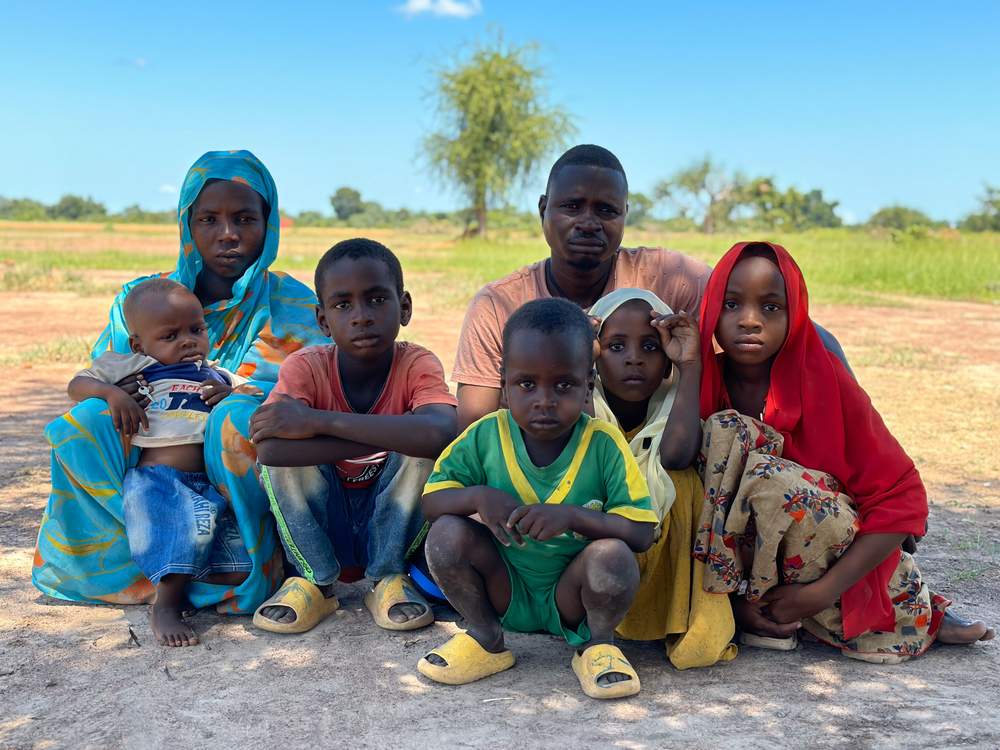OCHA: ‘Sudan experiencing humanitarian crisis of epic proportions’

Sudanese refugees Ahmed Ibrahm and Leymona Ahmed with their children at Wedweil refugee settlement in Northern Bahr El Ghazal, South Sudan (Photo: MSF/ Peter Bräunig)
The latest figures tracking the humanitarian situation in Sudan paint bleak picture. The UN Office for the Coordination of Humanitarian Affairs (OCHA) laments that “Sudan is experiencing a humanitarian crisis of epic proportions,” and that civilians are paying the price of the ongoing fighting. An estimated 20.3 million people – 42 per cent of the population – face acute food insecurity. Of these, 6.3 million people are at emergency levels of hunger, only one step away from famine, OCHA says.
In its latest Humanitarian Key Messages published today, the UN Office for the Coordination of Humanitarian Affairs (OCHA) shows that about half of the Sudanese population – 24.7 million people, including 14 million children – needs humanitarian aid and protection assistance. About 5.8 million people are displaced inside Sudan or have fled to neighbouring countries, half of whom are children. Women make up 69 per cent of the internally displaced, including those in war zones, and data from Chad indicates that 90 per cent of the refugees crossing the borders are women and girls. Similarly in Egypt, the UN Refugee Agency (UNHCR) has recorded that most of the registered households upon crossing the borders were female-headed ones. The conflict – and surging hunger, disease, and displacement – threatens to consume the entire country. It is time to silence the guns, OCHA says.
‘The conflict – and surging hunger, disease, and displacement – threatens to consume the entire country. It is time to silence the guns…’
OCHA further underlines that millions of people – especially in Khartoum, Darfur, and Kordofan – lack access to food, water, shelter, electricity, education, health care and nutrition. Hunger and malnutrition were already at record levels before the fighting, now, an estimated 20.3 million people – 42 per cent of the population – face acute food insecurity. Of these, 6.3 million people are at emergency levels of hunger, only one step away from famine.
‘The war in Sudan is now the world’s largest displacement crisis…’
OCHA asserts that the war in Sudan is now the world’s largest displacement crisis. As more refugees flee across Sudan’s borders, host communities in neighbouring countries are struggling. A protracted conflict in Sudan could tip the entire region into a humanitarian catastrophe.
Outbreaks of diseases pose a growing threat, particularly in overcrowded shelter sites and sites with poor water, sanitation, and hygiene. Sudan is already facing outbreaks of cholera, dengue, measles, and malaria. Projections based on Johns Hopkins’ Lives Saved Tool modelling indicate that at least 10,000 children under five years may die by the end of 2023 due to an increase in food insecurity, and disruptions to essential services. About 19 million children are awaiting schools to re-open.
‘Additional funds are urgently needed to meet immense needs…’
OCHA points out that humanitarian organisations continue to face immense obstacles to assist people in need. Bureaucratic and administrative impediments must be lifted so that aid workers can move supplies more swiftly. Visas, travel permits, and other procedures required to move staff and assistance inside the country delay the delivery of assistance. Looting and attacks against humanitarian personnel, facilities and supplies further compromise the ability of partners to deliver aid and services. Aid convoys face threats, roadblocks, restrictions, and bureaucratic impediments, while intensified airstrikes and shelling in Khartoum make safe access almost impossible.
Despite the challenges, humanitarian agencies in Sudan have made strides in accessing people across Sudan, including in hard-to-reach areas. Through both crossline and cross-border movements, convoys have reached East Darfur, North Darfur, South Darfur, West Darfur, North Kordofan, Jebel Aulia in Khartoum, and other areas. More than 3.7 million people have received lifesaving food, emergency shelter, health, nutrition, protection, and water, sanitation, and hygiene (WASH) and other assistance since 15 April.
An estimated 5.2 million people received livelihood assistance. OCHA urges that aid must be scaled up and sustained to reach more people in desperate need. To expand assistance to people in hard-to-reach areas, innovative approaches to working with communities are critical.
“Additional resources are urgently required to support a humanitarian response that was already significantly underfunded prior to the current conflict. Humanitarian actors require US$2.6 billion to provide life-saving multi-cluster assistance and protection services to 18.1 million people through the end of this year. So far, only 33.6 per cent has been received. Additional funds are urgently needed to meet immense needs, including critical funding to national NGOs on the frontlines of the response,” OCHA concludes.











 and then
and then